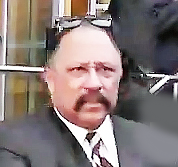
- WMC-TV
- Brooks on the way to jail Thursday night, We know why Channel 5’s Jason Mles is smirking. But for God’s sake why is she?
It has not been a good time lately for the Shelby County Democratic Party, and things just got worse. The party already faced a prolonged challenge over the outcome of a County Commission primary race and has endured both public ridicule and internal second-guessing over the Democratic executive committee’s rowdy meeting last week to endorse local judicial candidates. And then, late this week, local Democrats suffered two new embarrassments.
On Thursday evening, Shelby County Democratic chairman Bryan Carson was arrested on a bench warrant issued for his failure to pay a long overdue fine in environmental court. Gamely tweeting while handcuffed, Carson (since released on bond) seemed to be implying that the act of his arrest was somehow related to last week’s party endorsements, which had not included General Sessions environmental-court judge Larry Potter.
Then on Friday morning, County Commissioner Henri Brooks, now the Democratic nominee for Juvenile Court clerk, saw an already shaky electoral position worsen when witnesses identified her as the aggressor in a battle over a space in the parking lot of Methodist Hospital, where Brooks works.
In the altercation, the end portion of which was captured in a bystander’s cellphone video, Brooks, who sees herself as a kind of proconsul for African Americans, allegedly hurled racial insults at the woman driving the other car, bruised her when snatching away the other driver’s own cellphone and then poured the contents of a water bottle on the woman. Brooks, who has a history of volatility and contentious racial advocacy stretching back to her years as a state Representative, was already under fire for abusing an Hispanic witness during a recent Commission debate over a roofing contract which Brooks said favored Hispanic workers over blacks.
In the same meeting, she had accused a white colleague, Chris Thomas, of wearing a “sheet” and all but cursed out another colleague, Mike Ritz, letting a brief but pointed silence substitute for the crude expletive in a well-known idiomatic insult.
Though there had been a flurry of behind-the-scenes discussion both among members of the County Commission (censure of Brooks was briefly considered) and members of the local Democratic leadership, in the end both groups temporized in the apparent hope that memories would dim and the Henri Brooks problem would somehow go away over time.
Meanwhile, clear and probably irrevocable damage had been done to Brooks’ own once-promising campaign for Juvenile Court clerk, which had initially been buoyed by her well-known role in pressuring the Department of Justice to mandate reforms in the Court and was managed by no less a personage than attorney Ruby Wharton, wife of Memphis Mayor A C Wharton.
The fear remained among Democrats that the party’s entire slate might suffer from association with Brooks and incur a total shutout like that which Republicans, theoretically the minority party in Shelby County, had inflicted on Democratic candidates in the county election of 2010.
With assault charges now pending against Brooks as a result of the parking-lot incident (she turned herself in at Jail East on Thursday night), that fear has redoubled, and, even though some punitive action against Brooks now seems at least possible, imposed by the court system if not by the Commission or the Democratic Party apparatus, local Democrats have become fatalistic and privately discuss scenarios in which at least one party nominee — well-regarded Assessor Cheyenne Johnson — might hold on to win.
In particular, the Democratic candidacies of former County Commissioner Deidre Malone for Shelby County Mayor and Joe Brown (the onetime Criminal Court Judge who gained fame on the TV arbitration show “Judge Joe Brown”) seemed to be losing ground against the entrenched GOP incumbencies of Mayor Mark Luttrell and District Attorney General Amy Weirich, respectively.

• Brown, a controversial figure in his own right, is still regarded in some local Democratic circles as a potential party savior, even a “boss,” despite the fact that contempt-of-court charges against him, stemming from a March incident in Juvenile Court in which he upbraided the presiding magistrate in a child-support case, remain unsettled.
Though he has kept a low profile of late, Brown plays the role of elder statesman at party conclaves, intervening at moments of impasse to suggest possible strategies or policy directions. Most of his endorsees in last month’s Democratic primary for countywide positions failed to make it, but he was given credit for trying to foster a “Big Tent” party slate, diversified as to race and gender.
Brown’s lingering celebrity from his decade and a half on syndicated national TV still attracts crowds of autographed seekers and is a possible magnet at the polls (drawing out both Democratic voters and concerned Republicans), but what increasingly interests organization Democrats is the state of Brown’s bankroll and curiosity over how much of it survived divorce and the cancellation of his show last year, as well as how much of that remainder he might be willing to commit to an all-out Democratic push before early voting in mid-July and the August 7 general election.

• All the news has not been bad for Democrats. The ill wind (for Republicans) that has blown down U.S. House Majority Leader Eric Cantor in a Virginia party primary and is on the verge of doing the same to Mississippi’s venerable U.S. Senator Thad Cochran has inspired hopes among Democrats of a comeback of sorts at the state level.
Unquestionably, the political landscape has been shifted by the twin shocks of Tea Part state Senator Chris McDaniel over Cochran and the actual upset victory of previously unheralded Tea Partier David Brat over Cantor
In the immediate aftermath state Rep. Joe Carr (R-Lascallas), , was predictably exultant, hailing what he saw as a “transformational change from Virginia to Mississippi” among GOP voters and expressing a hope that his own primary challenge to Tennessee U.S. Senator Lamar Alexander would be correspondingly lifted. And, indeed, the nearly $500,000 raised for Carr’s campaign so far might look puny compared to the $7 million or so in Alexsander’s warchest, but Brat’s $100,000 campaign had been even more ill-matched against Cantor’s $5.7 million.
(And don’t forget George Flinn, the wealthy Memphis radio magnate/radiologist who served on the Shelby County Commission and has hazarded several other unsuccessful but handsomely self-financed races. Flinn’s current desultory U.S. Senate campaign, structured as an infomercial of sorts for Flinn’s own alternative to Obamacare , could metamorphosize into something else.)
The famed Koch brothers of Wichita and other underwriters of national Tea Party rebellion have not been much in evidence in Tennessee up until now, but not only Carr but other Tennessee Tea Partiers are actively hopeful that the Kochs et al. will redirect their attentions in Tennessee’s direction and that the state will become the site of the next showdown between the Republican establishment and a resurgent Tea Party.
The prospect of that happening and a newly glimpsed vision, however hazy at this point, that Alexander could lose or become damaged goods has rejuvenated Democratic hopes that what was already becoming an unusually active U.S. Senate primary race between Knoxville lawyers Gordon Ball and Terry Adams could actually land the victor of that contest in a competitive matchup against either Carr or a banged-up Alexander.
•Democrats in Shelby County, as elsewhere, are under pressure to choose sides. Ball has personal wealth from his trial victories over corporations and, for all his Steve Forbes-like fascination with the flat-tax idea, hews fairly closely to a moderate version of core Democratic concepts, including a pro-choice position on abortion and open-mindedness toward ultimate legalization of same-sex marriage.
Ball is distrusted in some party circles for his past involvement as a supportive Democrat in Alexander’s Senate campaigns and Haslam’s 2010 gubernatorial race. And these skeptics (who include Bob Tuke and Mike McWherter, the most recent Democratic losers to Alexander and Haslam, respectively) have thrown in with Adams, who carries the text of Thomas Piketty’s radical economic critique Capital in the 21t Century on his cell phone, campaigns on the theme of inequality, and in general appeals to progressive Democrats.
Both campaigns are beginning to solidify. Adams has fund-raising heavyweights like Doug Horne of Knoxville and Bill Freeman of Nashville working for him, and Ball has lately signed on the respected Steven Reid of Memphis’ Sutton Reid agency to handle his strategy and advertising.
Balls hire could be a two-edged sword, in that the politically ambidextrous Reid has managed several high-profile Republican campaigns locally, including that for District Attorney Amy Weirich, Joe Brown’s Republican opponent, and that fact could enable Adams to pry loose some cadres leaning to Ball.
But Reid made it clear in an interview with the Flyer that he sees the failure of statewide Democratic campaigns in recent years to lie in over-timid party efforts to sound like Republicans and avoid forthright expressions of traditional Democratic ideas. He cites former Arkansas U.S. Senator Dale Bumpers, an unambiguously progressive Democrat, as an ideal political figure.
A bottom line: For the next two months, both the Republican and Democratic primaries for U.S. Senate could heat up and become truly interesting contests. And, to borrow from a well-remembered Beatles lyric, you know that can’t be bad.